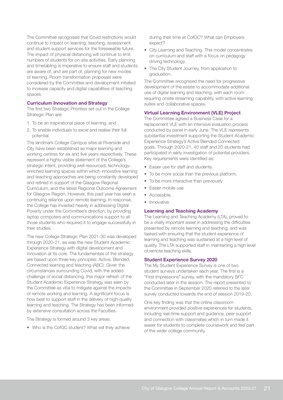
21
City of Glasgow College Annual Report & Accounts 2020-21
The Committee recognised that Covid restrictions would
continue to impact on learning, teaching, assessment
and student support services for the foreseeable future.
The impact of physical distancing will continue to limit
numbers of students for on-site activities. Early planning
and timetabling is imperative to ensure staff and students
are aware of, and are part of, planning for new modes
of learning. Room transformation proposals were
considered by the Committee and development initiated
to increase capacity and digital capabilities of teaching
spaces.
Curriculum Innovation and Strategy
The first two Strategic Priorities set out in the College
Strategic Plan are:
1. To be an inspirational place of learning, and
2. To enable individuals to excel and realise their full
potential
The landmark College Campus sites at Riverside and
City have been established as major learning and
working centres for six and five years respectively. These
represent a highly visible statement of the College's
strategic intent, providing well-resourced, technologyenriched learning
spaces within which innovative learning
and teaching approaches are being constantly developed
and refined in support of the Glasgow Regional
Curriculum, and the latest Regional Outcome Agreement
for Glasgow Region. However, this past year has seen a
continuing reliance upon remote learning. In response,
the College has invested heavily in addressing Digital
Poverty under the Committee's direction, by providing
laptop computers and communications support to all
those students who required it to engage successfully in
their studies.
The new College Strategic Plan 2021-30 was developed
through 2020-21, as was the new Student Academic
Experience Strategy with digital development and
innovation at its core. The fundamentals of the strategy
are based upon three key principles: Active, Blended,
Connected learning and teaching (ABC). Given the
circumstances surrounding Covid, with the added
challenge of social distancing, this major refresh of the
Student Academic Experience Strategy was seen by
the Committee as vital to mitigate against the impacts
of remote working and learning. A significant focus is
how best to support staff in the delivery of high-quality
learning and teaching. The Strategy has been informed
by extensive consultation across the Faculties.
The Strategy is formed around 3 key areas:
• Who is the CofGC student? What will they achieve
during their time at CofGC? What can Employers
expect?
• City Learning and Teaching. This model concentrates
on curriculum and staff with a focus on pedagogy
driving technology.
• The City Student Journey, from application to
graduation.
The Committee recognised the need for progressive
development of the estate to accommodate additional
use of digital learning and teaching, with each room
requiring onsite streaming capability, with active learning
suites and collaborative spaces.
Virtual Learning Environment (VLE) Project
The Committee agreed a Business Case for a
replacement VLE with an intensive evaluation process
conducted by panel in early June. The VLE represents
substantial investment supporting the Student Academic
Experience Strategy's Active Blended Connected
goals. Through 2020-21, 40 staff and 20 students had
participated in early investigation of potential providers.
Key requirements were identified as:
• Easier use for staff and students.
• To be more social than the previous platform.
• To be more interactive than previously
• Easier mobile use
• Accessible.
• Innovative.
Learning and Teaching Academy
The Learning and Teaching Academy (LTA), proved to
be a vitally important asset in addressing the difficulties
presented by remote learning and teaching, and was
tasked with ensuring that the student experience of
learning and teaching was sustained at a high level of
quality. The LTA supported staff in maintaining a high level
of remote teaching skills.
Student Experience Survey 2020
The My Student Experience Survey is one of two
student surveys undertaken each year. The first is a
"First Impressions" survey, with the mandatory SFC
conducted later in the session. The report presented to
the Committee in September 2020 referred to the later
survey conducted towards the end of session 2019-20.
One key finding was that the online classroom
environment provided positive experiences for students,
including real-time support and guidance, peer support
and connection with classmates which in turn made it
easier for students to complete coursework and feel part
of the wider college community.